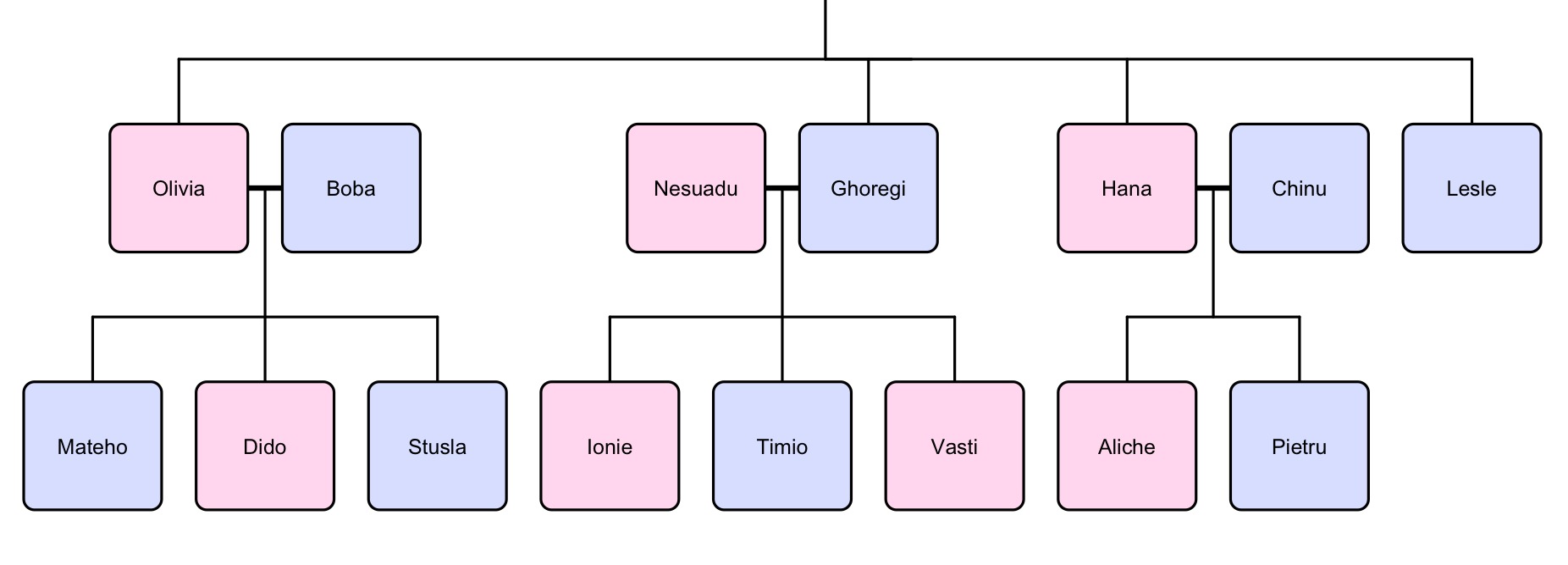Shortly after embarking on your trans-oceanic voyage, you meet an extended family who speak Stulano.* Although you don't share a language, they quickly "adopt" you as one of their own. You pass a couple of days playing with the kids and trying, through much trial and error, to communicate. By the end of the week, you can understand simple sentence structures in Stulano, but you're still trying to figure out how everyone is related.
The family consists of:
- Four men: Boba, Chinu, Ghoregi, and Lesle
- Three women: Hana, Nesuadu, and Olivia
- Four boys: Mateho, Pietru, Stusla, and Timio
- Four girls: Aliche, Dido, Ionie, and Vasti
The children range in age from around nine years old down to baby Pietru, who's not even crawling yet.
Dido, one of the older girls, takes a particular interest in explaining her family to you. "Mateho is my dresca," she tells you proudly, pointing to a boy around her age, "and Stusla"--a solemn little boy of perhaps eighteen months--"is my slui. Our bena and pama are there." She points to Boba and Olivia. "Pama is the merila of her family. I am the merila of Stusla, but not of Mateho.
"Timio and Vasti here are my pasli," she says, as a younger boy and girl chase each other around you. "Timio is the dresca. Their bena is my spiezu Ghoregi, who is Pama's slui. Rumispo Hana and Spiezu Lesle are also Pama's slui. Spiezu Ghoregi's neti is Rumispo Nesuadu, and Rumispo Hana's cico is Spiezu Chinu. Spiezu Lesle doesn't have a neti."
"Dido!" calls a girl around Dido's age, beckoning to her from across the deck.
"Call me Stitra Dido," Dido yells back. The other girl comes toward her, speaking in rapid-fire Stulano, and Dido replies with equal gusto. The good-natured argument lasts for half a minute and ends with both girls shoving each other and laughing.
"Ionie is Timio and Vasti's merila," says Dido, "but she's my pasli."
"Yes, Stitra Dido," Ionie says, rolling her eyes. "But I am the stitra of Stusla and Aliche and Pietru."
"So am I," Dido replies. "I'm the stitra of all of you!"
"Not of Mateho," Ionie retorts.
"No, but Mateho is your musua."
Wanting to prevent another argument, you ask Ionie, "Nesuadu is your pama, yes?"
She nods brightly.
"And Olivia is your rumispo?"
The girls burst into laughter. "No, no!" Ionie corrects you, "she's my snama. She's Aliche and Pietru's rumispo. My rumispo isn't here--this is my bena's family."
"So Boba is your..."
"Locrale."
"Is Lesle your locrale?"
Ionie nods again. "My bena is his dresca."
"And Rumispo Hana is his merila," says Dido, "although she's Spiezu Ghoregi's slui."
From what you now know about this family, fill in the blanks in the following statements:
- Ghoregi is Lesle's ____.
- Boba is Olivia's ____.
- Hana is Vasti's ____.
- Lesle is Stusla's ____.
- Chinu is Aliche's ____.
- Pietru is Dido's ____.
- Timio is Ionie's ____.
- Aliche is Pietru's ____.
Bonus question: What was Dido and Ionie's argument about?
* Stulano is a constructed language made by me, but for the purposes of this question you can treat it as if it were a natural language. However, you should not assume that it categorizes family relationships the same way as English does! You may assume that every child in this family has a father and mother who are monogamously married to each other, and that none of the children are married.

 Siblings are arranged from oldest > youngest
Siblings are arranged from oldest > youngest